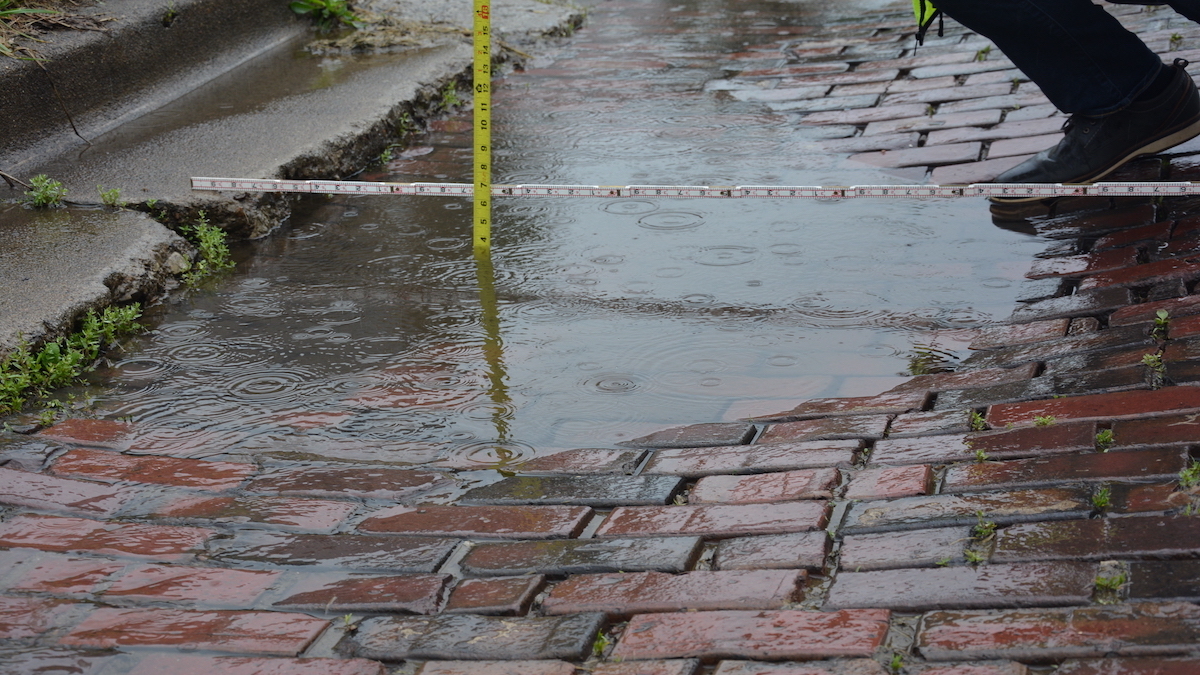MOUNT VERNON – The city will start repairing brick street potholes with the first contract in a new program approved by the Mount Vernon City Council.
A contract will be entered to kickstart the program with Brennstuhl Construction Inc. of Belleville, Ohio, City Engineer Brian Ball told the Mount Vernon News. Repairs will start in a couple of weeks between the 200 and 400 blocks of Burgess Street, Ball said.
The contract is slightly over $25,000.
He said the city is still looking for other companies interested in this work.
Street Department sweeps streets, fixes catch basins
Public Works Director Tom Hinkle said the weather has allowed crews to start street sweeping. Coshocton Avenue was one of the key streets that got some cleaning.
Some aggregate, gravel alleys were graded to reduce the potholes. Crews will come back later to add more gravel when the weather allows on non-rainy, dry days.
“Typically, you don't do alley grading until it’s dry, but we have been trying to get into some of the alleys that got real bad with the winter and the potholes,” he said.
More catch basin repairs were completed, including rebuilding a catch basin on Marion Street.
Rebuilding a catch basin is necessary when it has failed perhaps with a sidewalk caved in on it, or if a pipe placed in the catch basin was allowing the ground to suck down from underneath the road, creating a pothole, Hinkle said. It could also be as simple as a single wall needing repairs or replacement.
“And then the more intense ones we literally rip out the catch basin and pour a new catch basin,” he said. “We pour and form a whole new concrete catch basin.”
Traffic lights upgraded, realigned
The street department replaced and upgraded the pedestrian crosswalk for a school crossing at Martinsburg Road and Pine Street, Hinkle said. The traffic signals include the new required countdown.
Traffic lights at the Newark and Columbus Roads intersection were realigned to match the lanes of traffic, he said.
The engineering department uses concrete for longer-lasting patches.
The engineering department updated its standards two or three years ago to create a better temporary pothole patch, Ball said. Many cities use a cold mix on asphalt, which he said is “more like an Alka Seltzer; as soon as it snows, it gets wet, it's gone.”
That would force crews to go out a few times each week to make patches. The city created an allowable concrete patch that’s used that lets them plow snow. When the winter season is over, the concrete can be removed so asphalt can be put down.
Community Garden at Arch Park expands
The city has expanded the community garden at Arch Park to 60 feet by 80 feet, adding 20 feet in length, Hinkle said.
The parks department has partnered with the community garden, supplying them with a picnic table and the installation of raised beds to make the garden handicap accessible.
A storm in June destroyed the home team dugout at Memorial Park. The decision was made to replace both the home team and visitor’s dugouts as both were old. Two new chain link-style dugouts replace the old dugouts.
Flooring, painting on track at city hall, fire station
Public Buildings and Land replaced the carpet in the city hall conference room and replaced the basement flooring with new vinyl tile. Area Development Foundation President Jeff Gottke supplied the city with a glass whiteboard, which the department installed in the conference room.
Painters have been working on interior and exterior trim at the fire station.
Utilities candidates interviewed
Utilities Director Aaron Reinhart said several candidates were interviewed for the wastewater superintendent and administrative director for collection and distribution roles. The search has been narrowed down, and an offer will be made with city council approval.
Two weeks of phosphorous testing was just completed by staff to comply with the Ohio Environmental Protection Agency requirements.
Water, wastewater, tap fee increases explained
The city of Mount Vernon increased its water, wastewater and tap fees to cover increased costs.
In early 2021, city council had voted to approve 15% wastewater increases over three years, with this being the third and final 15% increase, Safety Services Director Rick Dzik told the Mount Vernon News.
Capacity fees were increased for any new building in the city, he said.
“It’s really to cover the increased cost of having more housing units connected to our utility system,” he said.
The water tap fee was set at $3,000 with $2,000 for wastewater tap fees. Each also requires a $75 permit fee.
The water rate was also increased by 5% as of March 1, but customers won’t see it on their bill until April 1. It was the first water increase since 2017, he said.
“We think it’s a modest amount compared to the past,” Dzik said.
It works out to an increase of a little more than $1 a month on a minimum water bill.
The city will work with a consultant firm to perform a utility rate analysis to determine what plans should be made.
“Historically, the city has kind of waited for years and then got a really big increase, which as you know, can really hit the pocketbooks,” he said. “If we can figure out how to do very small increases more frequently, it shouldn’t impact customers as much, and that’s what we’re trying to work toward.”




.webp)
.webp)
